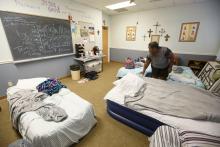Found 195 resources.
0
0
0
A program called Find the Fit, which combines personalized planning materials and text messaging for students, and training webinars for advisors, increased the number and selectivity of colleges to which students apply. This report, the first from a six-year study, determined that Find the Fit led to some changes in the advising within Upward Bound and in students’ actions related to enrolling in a more selective college.
Topics: Education, Low-income, Post-secondary, Research, Youth
0
0
0
Public schools identified more than 1.3 million children and youth experiencing homelessness and enrolled in school at some point in the 2016-2017 school year.1 These numbers do not reflect the total number of children and youth who experience homelessness in the United States.
Topics: Education, Homelessness, Housing, Research, Youth
0
0
0
More than 56 million people live in communities that are classified as high opportunity areas. These neighborhoods often provide access to certain amenities or community attributes that are believed to increase economic mobility for their residents. However, they are also often encumbered by high costs of living and dense populations. As a result, the supply of affordable housing is unable to support the demand. In an effort to combat this, there has been an increased focus from research, policy and affordable housing groups on deconcentrating poverty and promoting affordable housing in high...
Topics: Education, Health, Housing, Low-income, Mobility, Safety
0
0
0
Colleges and higher education systems can make institutional policy changes to bolster the success of students who are parents and their families through intentional use of a two-generation approach. This brief focuses on traditional two-year and four-year baccalaureate pathways for students who are parents; it complements a brief released on policy solutions.
Topics: Dual-generation, Education, Low-income, Partnerships, Post-secondary, Youth
0
0
0
There are opportunities for federal and state policies to better support postsecondary institutions in serving students who are parents and their families. Policymakers can incentivize partnerships, name students who are parents as special or target populations, and facilitate financial aid processes that address the needs of families. Where possible, policies can also encourage creative and innovative approaches to leveraging existing programs to facilitate access and successful completion for parenting students. These recommendations seek to promote policy changes that address the critical...
Topics: Dual-generation, Education, Legislation & Policy, Partnerships, Post-secondary, Research, Workforce development, Youth
0
0
0

Many youth experiencing homelessness report avoiding shelters because they don’t feel safe there or can’t relate to the older adults, but they often don’t have another option. It’s a problem that many jurisdictions are working to correct, understanding that although homeless youth and homeless adults have similar needs, reaching these young people may require different spaces and different strategies.
Topics: East Coast, Education, Homelessness, Housing, Low-income, Metrics, Post-secondary, Safety, Youth
0
0
0

Current efforts to end homelessness are largely focused on the immediate housing needs of adults. Yet recent research further demonstrates the importance of addressing childhood, early care, and education in efforts to prevent and end homelessness. This blog post summarizes five new studies. Topics include homelessness in the womb and during infancy; the Adverse Childhood Experiences of homeless adults; the employment of families during and after stays in homeless shelters; and the impact of Rapid Rehousing on the education of children and youth experiencing homelessness.
Topics: Child welfare, Dual-generation, Early childhood, Education, Health, Homelessness, Housing, Low-income, Pre-natal, Research
0
0
0
CLPHA’s Housing Is Initiative is engaged in a number of cross-sector activities focused on developing partnerships, facilitating a community of practice, resource development, promoting best practices, online collaboration, policy and advocacy, and training and education. Read about recent activities in this Fall Update.
Topics: Child welfare, CLPHA, Community development, Cost effectiveness, Data sharing, Early childhood, Education, Family engagement, Funding, Health, Homelessness, Housing, Low-income, Medicaid / Medicare, Mental health, Partnerships, Place-based, Post-secondary, Research, Stability, Substance abuse, Workforce development, Youth
0
0
0

Some community colleges have found innovative partnerships with their public housing authorities may help combat student homelessness.
Topics: Asset building, CLPHA, Education, Homelessness, Housing, Low-income, Midwest, Pacific Northwest, Partnerships, Post-secondary, Stability, Workforce development
0
0
0
Which neighborhoods in America offer children the best chance to rise out of poverty? The Opportunity Atlas answers this question using anonymous data following 20 million Americans from childhood to their mid-30s. Now you can trace the roots of today's affluence and poverty back to the neighborhoods where people grew up. See where and for whom opportunity has been missing, and develop local solutions to help more children rise out of poverty.
Topics: Asset building, Child welfare, Dual-generation, Early childhood, Education, Health, Housing, Low-income, Mobility, Stability, Youth
 Shared by Housing Is
on Oct 12, 2018
Shared by Housing Is
on Oct 12, 2018 0
0
0
Assisted housing mobility is both a housing policy and a civil rights practice, giving low income families participating in our largest federal housing program – the Housing Choice Voucher program – a real choice to move to neighborhoods and communities of their choice, including high opportunity communities from which they have been traditionally excluded.
Topics: Education, Housing, Low-income, Mobility
 Shared by Housing Is
on Oct 12, 2018
Shared by Housing Is
on Oct 12, 2018 0
0
0
This initiative is generating innovative ideas that will help us address the affordable housing crisis in America and further support our broad mission to create housing opportunities that are safe, sustainable, and affordable, while managing risk to protect lenders, homeowners, and taxpayers.
Specifically, The Challenge is a $10 million commitment by Fannie Mae to generate affordable housing solutions that will help Fannie Mae address the nation’s affordable housing issues by advancing sustainable communities–those providing residents integrated opportunities for employment, health and...
Topics: Education, Funding, Health, Housing, Low-income, Workforce development
0
0
0
Topics: Child welfare, Early childhood, Education, Health, Homelessness, Low-income, Pre-natal
0
0
0
Young people are the workers of today and tomorrow. But those who become parents in their teenage years and early 20s, just as they are getting started in the world of work, are often confronted with a harsh reality: odds stacked against their ability to earn, learn and raise a family, which can threaten their children’s future as well as the strength of our communities.
Topics: Early childhood, Education, Legislation & Policy, Post-secondary, Pre-natal, Research, Workforce development, Youth
0
0
0
This short document provides basic information to help housing and homeless assistance providers advocate with their families and youth for appropriate educational services, from birth through higher education. The rights and protections outlined here apply to all children and youth experiencing homelessness, as defined by the education subtitle of the McKinney-Vento Act.
Topics: Disabilities, Dual-generation, Early childhood, Education, Family engagement, Homelessness, Housing, Legislation & Policy, Low-income, Post-secondary, Youth
0
0
0
Enhance your knowledge around family homelessness and the McKinney-Vento Homelessness Assistance Act's definition of "homeless" as it refers to children and youth. Review other relevant federal regulations for Head Start, Early Head Start, and Child Care and Development Fund (CCDF)-subsidized programs.
This interactive learning series is intended for professionals in Head Start, Early Head Start, and child care, including early childhood and school-age child care providers, CCDF Lead Agency or designated entity staff, and other key stakeholders. Learn how to identify...
Topics: Child welfare, Early childhood, Education, Family engagement, Grade-level proficiency, Homelessness, Housing, Low-income, Stability
0
0
0

A strategy for community problem-solving does an extraordinary job at restoring our social fabric.
Topics: Community development, Education, Partnerships, Place-based, Youth
0
0
0

An organization is using the influence that teenagers have on their contemporaries to help more students from low-income families gain college admission and student aid.
Topics: Education, Low-income, Mental health, Post-secondary, Stability, Youth
0
0
0
Students have around 60 programs at their disposal, from advanced manufacturing to emergency medical response.
Topics: East Coast, Education, Food insecurity, Health, Low-income, Post-secondary, Youth
0
0
0
Many social issues stem from a history of unstable, unaffordable, and poor-quality housing. Research shows that housing is the first rung on the ladder to economic opportunity for individuals and that a person’s access to opportunity is intrinsically linked with that of the community at large. As the gap between rents and incomes widens, it is critical that professionals in fields outside housing—including health, education, and economic development, among others—understand its central importance.
Topics: Community development, Education, Health, Housing, Low-income, Metrics, Partnerships, Research
0
0
0

Harvey — and its record rains — is long gone. But life may never be the same for thousands of children who spent the past school year — and will spend the one that just began — without a home. Their schools have been rebuilt. Their lives have not.
Topics: Child welfare, Education, Homelessness, Housing, Low-income
0
0
0
The King County Housing Authority (KCHA), in partnership with the Highline School District and the nonprofit social service organization Neighborhood House, launched the Student and Family Stability Initiative (SFSI) pilot program in 2013 to provide housing and employment supports to homeless and unstably housed families with children enrolled in Highline elementary schools. In 2016, KCHA contracted with the Urban Institute (Urban) to conduct a process and outcome evaluation of the program’s first three pilot years. This evaluation documents how SFSI works, who it serves, and how well it...
Topics: Attendance, Dual-generation, Education, Family engagement, Housing, Low-income, Pacific Northwest, Partnerships, Place-based, Research, Stability, Workforce development, Youth
0
0
0
Evidence shows that investing in children today can decrease poverty for the next generation of adults. Host Justin Milner speaks with researchers Heather Hahn and Cary Lou about the federal government’s current spending on kids, future projections for this spending, and what that means for America’s children.
Topics: Child welfare, Early childhood, Education, Funding, Legislation & Policy, Research, Youth
0
0
0
About MDRC’s “Evidence First” Podcast Series:
Policymakers talk about solutions, but which ones really work? Join Katie Beal, MDRC’s External Affairs Associate, as she talks with experts about the best evidence available on education and social programs that serve low-income people.
Topics: Education, Funding, Legislation & Policy, Low-income, Post-secondary, Workforce development, Youth
0
1
1

Our initial report—which followed participants around the country over three years—found, among other things, that Year Up increased participants’ average quarterly earnings by more than 50 percent. These are the largest gains in earnings measured to date in random assignment studies of workforce training programs for youth and adults.
Topics: Asset building, Education, Low-income, Mobility, Post-secondary, Research, Workforce development, Youth
 Shared by Housing Is
on Aug 16, 2018
Shared by Housing Is
on Aug 16, 2018 
